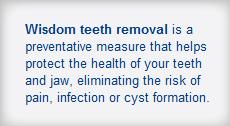Why wisdom teeth extraction may be needed
 Wisdom teeth (also known as third molars) tend to grow in between ages 17 and 25, causing pain and disruption of dental alignment. Most people have between one and four wisdom teeth, but some have as many as eight. Problems can arise when these final molars attempt to enter the mouth with limited space for them to surface. To avoid impacted teeth, which can cause pain and lead to infection or cyst formation, it’s recommended that these teeth be removed surgically by the time the patient is a young adult, when the wisdom teeth roots are not yet fully developed and the bone is less dense.
Wisdom teeth (also known as third molars) tend to grow in between ages 17 and 25, causing pain and disruption of dental alignment. Most people have between one and four wisdom teeth, but some have as many as eight. Problems can arise when these final molars attempt to enter the mouth with limited space for them to surface. To avoid impacted teeth, which can cause pain and lead to infection or cyst formation, it’s recommended that these teeth be removed surgically by the time the patient is a young adult, when the wisdom teeth roots are not yet fully developed and the bone is less dense.
What to expect before, during and after surgery
 Your Northwest Oral & Facial Surgeon will meet with you prior to the procedure for a consultation in which he’ll review your wisdom teeth with the help of a panoramic x-ray that shows your entire upper and lower jaws. Be sure to let your doctor know about any illness you have and medications you take. Depending on the position of the teeth, root development and your preferences, he will recommend local anesthesia, intravenous sedation or general anesthesia. After surgery, you may have swelling and mild discomfort for several days. Cold compresses and prescribed medication can help alleviate these normal healing symptoms, and a liquid diet or soft foods may be recommended temporarily. For further information, refer to our pre- and post-surgery instructions.
Your Northwest Oral & Facial Surgeon will meet with you prior to the procedure for a consultation in which he’ll review your wisdom teeth with the help of a panoramic x-ray that shows your entire upper and lower jaws. Be sure to let your doctor know about any illness you have and medications you take. Depending on the position of the teeth, root development and your preferences, he will recommend local anesthesia, intravenous sedation or general anesthesia. After surgery, you may have swelling and mild discomfort for several days. Cold compresses and prescribed medication can help alleviate these normal healing symptoms, and a liquid diet or soft foods may be recommended temporarily. For further information, refer to our pre- and post-surgery instructions.
Patient Registration?
Ms. Dendiu the patient registration is under the For Patients tab. Once their click on online registration form. Once you have entered all the pertinent information click the submit button at the end.
Sincerely,
Mel G
NWOFS